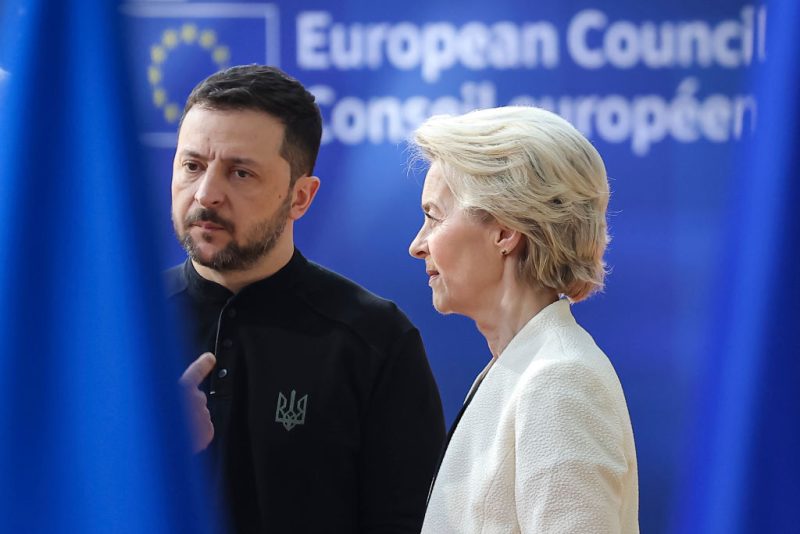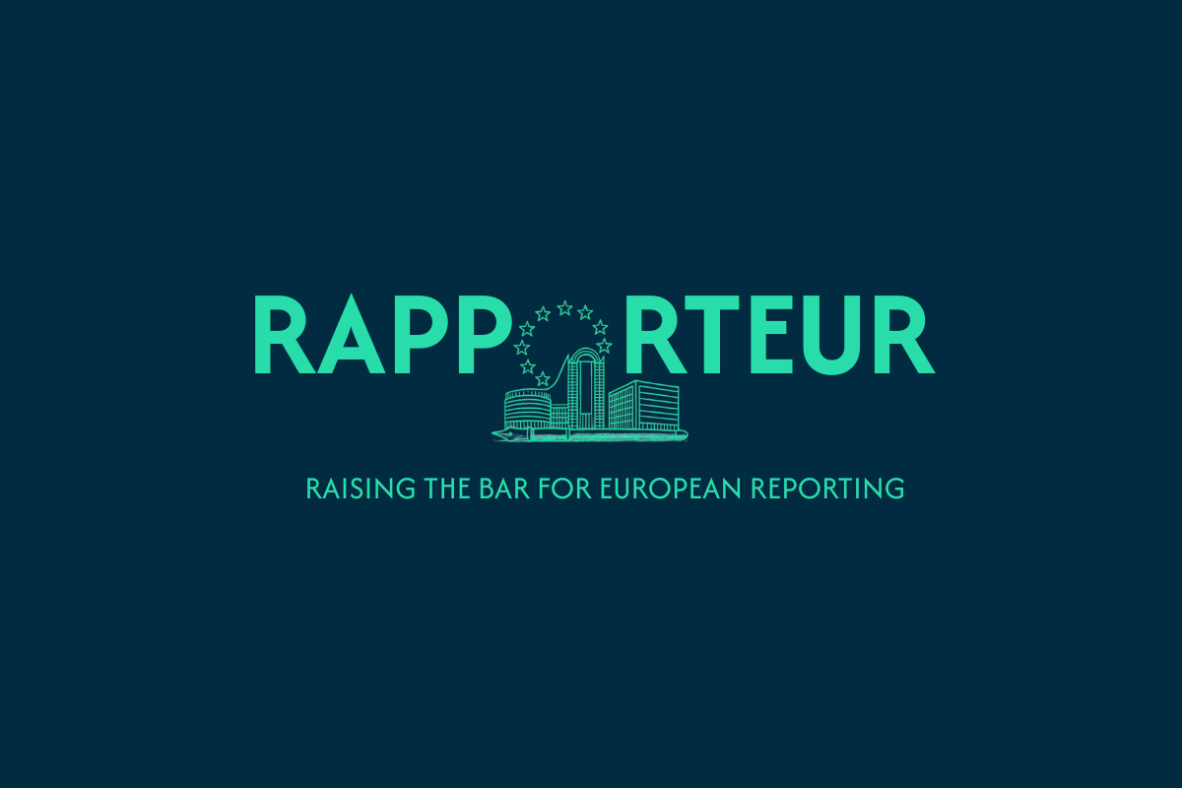Exclusive: EU plots €1 billion revamp of Council HQ
In today’s edition: both the EU and US are poised to impose new sanctions on Russia, MEPs send the simplification drive into uncharted waters, and Giorgia Meloni prepares to unveil a migration plan at a leaders’ breakfast

EXCLUSIVE: The Council’s Justus Lipsius building, where we journalists will spend all day and night covering today’s summit and scarfing steak frites in a subterranean canteen, is gearing up for a ten-year renovation that could cost up to €1.1 billion, Nicoletta and I report today.
JUST…US PAYING: The institution says the project will save money in the long run and is needed to keep the building in line with energy efficiency rules. But at a time of belt-tightening across the bloc, the sheer costs will raise eyebrows. Read our full story here.
OPEN THIS TAB: My excellent colleagues will bring you a blow-by-blow from the European Council in our live blog today. Read it here.
Welcome to Rapporteur. This is Eddy Wax, with Nicoletta Ionta in Brussels. Both of us and many of our colleagues will be at the Council today. Come say hi!
Need-to-knows:
- Geopolitics: The EU and US are both poised to impose sanctions on Russia
- Red tape: MEPs sent the simplification drive into uncharted waters
- Migration: Giorgia Meloni will unveil a migration plan at a leaders’ breakfast
Today’s edition is powered by Cement Europe
A message from Cement Europe
A new chapter begins.
Building on centuries of reliability, Cement Europe (formerly CEMBUREAU) is shaping the future of a sector that’s essential to Europe’s competitiveness, autonomy, and green transition – a reliable foundation, a driver for change, and a constant ally in building Europe’s sustainable future.
From the capital
It’s European Council day. The leaders of every Member State will spend it in a room trying to agree on 16 pages of intentionally ambiguous text. Here’s what to know.
Sanctions. Last night, Slovakia dropped its veto on the new, 19th sanctions package against Russia, paving the way for ambassadors to finally approve it this morning. That clears one of the thorniest issues off the leaders’ agenda. Fico was hunting for concessions on energy prices and the car industry and has been mollified with wording in the draft conclusions. The US slapped sanctions on Russia’s two largest oil companies last night. Von der Leyen said it’s a “clear signal from both sides of the Atlantic that we will keep up collective pressure on the aggressor.”
Climate. The EU’s 2040 climate target, however, is one topic where the discussions could truly turn ugly. The road to this meeting has been paved by concessions from the Commission, keen to secure a highly ambitious target of reducing emissions by 90% compared to 1990. There’s been a backlash from central and eastern countries, backed by France and Germany, who are worried about the economic costs of transitioning too hard, too fast. Leaders tend to set these targets themselves, but António Costa, who chairs the meeting, wants to avoid a nasty showdown, so whatever happens, the final decision will be kicked to environment ministers next month.
Reparations. Ukraine is facing a financial black hole. But Belgium is still worried about the legal and financial consequences of a vague EU plan to fashion a loan out of the €140 billion frozen Russian central bank assets held by Euroclear. Leaders, except Viktor Orbán, will demand a “concrete” proposal, and some are already debating how the money should be spent. But this is premature. As Thomas Møller Nielsen writes in this must-read piece, the debate about the loan is only beginning.
Defence. Volodymyr Zelenskyy is here to join the meeting. The Budapest peace summit is off the table for now, but it looks like Hungary will be the first in line to host Putin-Trump talks if they ever happen. EU leaders will agree to take charge of European defence by forming multicountry projects, Aurélie Pugnet writes for defence subscribers.
Housing. On the agenda for the first time. Some countries want the EU to treat this as a crisis. Others want Brussels to stay in its lane.
Red tape: Metsola under pressure from leaders
Parliament President Roberta Metsola will sweep into the European Council this morning facing a barrage of pressure from national leaders over the Parliament’s role in the EU simplification drive.
A shock vote by MEPs on Wednesday to reject the first major attempt to overhaul sustainability laws has caused a huge headache for leaders demanding quick-fire simplification. 19 of them upped the ante in a letter Rapporteur wrote about this week.
After weeks of grumbling from leaders, Metsola herself has been on a campaign drive to show how committed she is to the red-tape bonfire, making speeches, writing op-eds and defending the Parliament’s commitment to speed. The pressure comes as Metsola is not quashing talk about her taking on a third term.
Lara Wolters gets her revenge
Lara Wolters, a Dutch Socialist who masterminded the due diligence law, was forced into a humiliating resignation from her role as an omnibus negotiator this month, when her Socialist group agreed with the EPP and Renew on a compromise she couldn’t accept. Then on Thursday, she and some 30 other Socialists rebelled against their own group to blow up the agreement.
“There is only one way forward, and that is to go back to where we should have started. With good faith negotiations and compromise on all sides,” Wolters wrote on social media. She said it was a “sad day” and piled the blame on the EPP.
Officially we can’t know who voted to blow up the fragile compromise which failed by 9 votes. That’s because the vote was made secret at the behest of the far-right. But though secret, Magnus Lund Nielsen obtained a list of the 31 MEPs outside the right-wing groups who played a role in pushing the vote to a plenary vote, suggesting they were unhappy with the compromise.
And guess what? All 31 are socialists. The entire French, Austrian, Dutch, Polish S&D delegations included. They contested the committee decision, forcing it to a vote in plenary.
Meloni pushes roadmap for ECHR migration talks
The now-traditional migration hawks breakfast ahead of the EUCO meets again today, this time hosted by Denmark’s Mette Frederiksen. On the menu: international conventions and how to make sure their implementation reflects the realities of modern irregular migration, “unthinkable when those conventions were written,” as Italy’s Giorgia Meloni noted ahead of the summit.
Meloni said that Italy will propose a roadmap – in coordination with Council of Europe Secretary-General Alain Berset – that could lead to a first political debate in Strasbourg in the coming months.
The push follows an open letter by Denmark and Italy, later backed by about ten member states including Poland, Austria, and Hungary, accusing judges of overreach in migration rulings. This month, Berset told Euractiv he was “a bit surprised” by the move, warning that efforts to curb the Court of Human Rights’ role are “the wrong way to start a productive discussion.”
Right-wingers dominate budget negotiations
At a closed-door meeting on Wednesday, the EPP sided with the far-right to get its own MEPs into key negotiating roles on the upcoming €2 trillion EU budget, Jacob Wulff Wold told me.
The EPP ensured that when it comes to the €865 billion merger of regions and farm subsidies, the ECR-led budget committee – under Johan van Overtveldt – will hold the whip hand. That came at the expense of the employment and social affairs committee (EMPL), which is led by the Left group.
“Removing EMPL from a file where we have competence on the policy content seems to be yet another attack on the social agenda during this mandate,” EMPL chair Li Andersson told Rapporteur.
As for the €234 billion competitiveness fund, the EPP secured a key leadership role for Borys Budka’s industry committee, instead of sharing it with the S&D-led economy or environment committees.
The capitals
BERLIN 🇩🇪
Chancellor Friedrich Merz, battling a surge in support for the far-right AfD ahead of five key state elections in 2026, has come under fire for remarks widely seen as echoing racist tropes about immigrants, sparking one of the biggest controversies of his chancellorship. Speaking to reporters in Potsdam last week, Merz said that while deportations of rejected asylum seekers had accelerated, “of course, we still have this problem in how our cities look,” using the German word for cityscape or city appearance: Stadtbild.
STOCKHOLM 🇸🇪
Ukrainian President Volodymyr Zelensky and Swedish Prime Minister Ulf Kristersson on Wednesday signed a preliminary agreement for Ukraine to purchase between 100 and 150 JAS 39 Gripen E fighter jets – the newest generation of Sweden’s multirole aircraft. The ceremony took place at Saab’s plant in Linköping, southern Sweden. Kristersson said the deal foresees no new donations but a “long-term defence cooperation,” potentially the largest fighter contract in Swedish history. Possible financing options include frozen Russian assets or contributions from allied countries. Zelensky praised the jets as “fantastic,” noting that Ukraine hopes to secure at least 100 aircraft over time.
ROME 🇮🇹
Prime Minister Giorgia Meloni on Wednesday celebrated three years in office, making her government the third longest-serving in Italy’s postwar history. Since taking power in October 2022, Meloni has maintained an unusually stable right-wing coalition, a rarity in Italian politics. Marking the milestone, she posted a video recalling her recent UN address, in which she invoked Saint Francis and pledged to “see the path through to the end,” even as her government faces growing fiscal strains and coalition tensions over the 2025 budget.
PARIS 🇫🇷
The government is expected to approve an “amending letter” enabling the suspension of the 2023 pension reform to be added to the draft 2026 Social Security Finance Bill. The suspension is the key demand of 69 Socialist MPs, who have threatened to back a no-confidence motion unless it is included. Parliament will begin examining the bill next week and will have 50 days to reach a compromise – failing which, the government could adopt the text by decree.
MADRID 🇪🇸
The Spanish Supreme Court judge investigating MEP Alvise Pérez for alleged slander and document falsification has requested judicial cooperation from US authorities to access data stored by social media site X. According to the court ruling, the probe centres on Pérez’s alleged dissemination of a falsified 2021 COVID-19 test result belonging to Catalonia’s regional President Salvador Illa, who was Spain’s health minister at the time. Last week, the court also asked the European Parliament to lift Pérez’s immunity to expand the investigation to alleged irregular financing and harassment of two Se Acabó la Fiesta MEPs.
DUBLIN 🇮🇪
Ireland’s presidential election on Friday looks likely to be won by far-left candidate Catherine Connolly, according to new polling, which suggests she will comfortably beat Heather Humphreys, the candidate from ruling party Fine Gael. Sinn Féin is backing her candidacy. Connolly has been criticised for describing Hamas as “part of the fabric of the Palestinian people.” She later denied ever equivocating on Hamas. The role is a ceremonial one.
Schuman roundabout
PARDON MY HUNGARIAN: Hungarian far-right lawmaker Zsuzsanna Borvendég will be penalised for “inappropriate behaviour with swear words and actions against staff in the Parliament,” Roberta Metsola announced on Wednesday. Without providing details, Metsola said Borvendég’s actions had “damaged the Parliament’s reputation.” Borvendég, who didn’t reply to Magnus Lund Nielsen’s request for comment, will not receive her daily allowance of €350 for five days, as punishment.
THE ROOM WHERE IT HAPPENS: The Council has published a seven-minute documentary about what it’s like at a European summit. In short: there’s a lot of small talk, note-taking, walking around and waiting. Exhilarating!
Also on Euractiv
Why the EU debate over Ukraine’s ‘reparation loan’ has only just begun
EU leaders meeting on Thursday are expected to ask the European Commission to draw up…
5 minutes

EU leaders meeting on Thursday are set to task the European Commission with drafting a concrete plan to use frozen Russian assets – worth some €140 billion – to fund Ukraine’s war effort, reviving a heated debate over legality, feasibility, and financial risk. Belgium, which hosts most of the assets via Euroclear, remains deeply wary of endangering its clearinghouse or violating international law, while the ECB has warned of threats to the euro’s credibility.
When the AI bubble bursts, will Europe be ready?
AI investment has entered its euphoria stage. Analysts forecast global spending will reach $1.5 trillion…
4 minutes

AI spending is rocketing to $1.5 trillion next year, outpacing even the dot-com boom and stoking a new wave of speculative hype. When the bubble bursts – as history suggests it will – Europe’s tech ecosystem, dependent on foreign capital and infrastructure, could face a double shock of funding collapse and deeper dependency.
Senior visiting fellow at the European Policy Centre, associate fellow at the Geneva Centre for Security Policy, and author of ‘The Rest of Your Life: Five Stories of Your Future,’ Chris Kremidas-Courtney argues that Europe must start planning for the crash: use regulation to steady the market, back critical AI ventures when private capital dries up, and turn excess infrastructure into public assets. The bust could yet become Europe’s moment to lead.
Agenda
📍 European Leaders’ Summit in Brussels
📍 Roberta Metsola participates in the EPP Summit and the European Council; meets Egyptian President Al-Sisi
📍 EP Plenary in Strasbourg, with debates on: the Audiovisual Media Services Directive; combating violence against women; the importance of cancer screening; daylight saving time
Contributors: Magnus Lund Nielsen, Nikolaus J. Kurmayer, Thomas Møller-Nielsen, Jacob Wulff Wold, Sarantis Michalopoulos, Laurent Geslin, Alessia Peretti, Charles Szumski, Inés Fernández-Pontes
Editors: Matthew Karnitschnig, Sofia Mandilara



